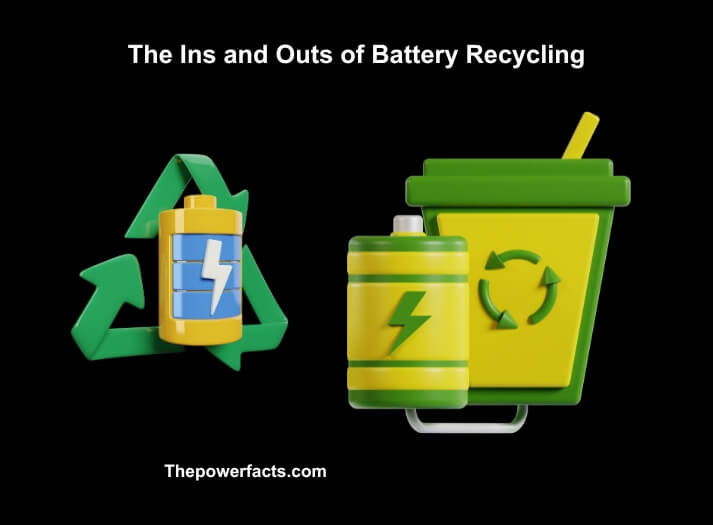Published on: April 25, 2023
Written by Jonas Frank / Fact-checked by Nova Scarlett
The saying “out with the old, in with the new” might seem fitting when it comes to technology, but what happens to the “old”? Take batteries, for instance. These small powerhouses drive everything from our smartphones to electric vehicles (EVs). But once they’ve run their course, they can pose a significant environmental threat. That’s where battery recycling comes in – an eco-friendly solution that’s gaining momentum in our race towards a sustainable future. So, buckle up as we delve into the electrifying world of battery recycling!

A Charged-Up Issue: The Environmental Impact of Batteries
The Growing Problem of E-Waste
As our reliance on technology grows, so does the volume of electronic waste (e-waste) generated. Batteries, in particular, contribute significantly to this problem. Consider these alarming facts:
- Every year, millions of tons of used batteries end up in landfills
- Toxic materials like lead, cadmium, and mercury can leach into the environment, contaminating soil and water
- E-waste is responsible for up to 70% of the toxic heavy metals found in landfills
The Flip Side: Benefits of Battery Recycling
The good news is that battery recycling offers a viable solution to this environmental quandary. Here’s how:
- Reduces the need for raw materials, as recycled metals can be used in new batteries
- Decreases the volume of e-waste, preventing toxic substances from harming the environment
- Lowers greenhouse gas emissions by reducing energy consumption in the production of new batteries
Powering Up: Different Types of Battery Recycling Processes
Battery recycling typically involves three main stages:
- Collection and sorting
- Pre-treatment (mechanical and pyrometallurgical)
- Recovery of materials
Collection and Sorting
The first step is to collect used batteries and sort them by type, such as lead-acid, nickel-cadmium, or lithium-ion. Proper sorting ensures that each battery is processed using the most suitable method.
Pre-Treatment: Mechanical and Pyrometallurgical Methods
Next, batteries undergo a pre-treatment process to break them down into smaller components. This can involve mechanical methods, such as crushing or shredding, or pyrometallurgical methods, like smelting, to separate metals from other materials.
Recovery of Materials
Finally, valuable materials like lead, nickel, and lithium are extracted and purified for reuse in new batteries. This process can involve hydrometallurgical techniques, like leaching, or electrochemical methods, such as electrowinning.
How Can Battery Recycling Impact Binary Cycle Power Plants?
Battery recycling can significantly impact the mechanics of binary cycle power plants. By properly recycling batteries, the demand for new batteries decreases, thereby reducing the need for the raw materials used in them. This can lead to a more sustainable and environmentally friendly operation for binary cycle power plants.
Frequently Asked Questions
Can all types of batteries be recycled?
Most batteries can be recycled, including lead-acid, nickel-cadmium, nickel-metal-hydride, and lithium-ion. However, recycling processes can vary depending on the battery type.
How can I recycle my used batteries?
To recycle your used batteries, look for local battery recycling programs or drop-off points, such as at retail stores, recycling centers, or community events.
Are there any safety concerns when recycling batteries?
Yes, handling used batteries can be hazardous, especially if they’re damaged or leaking. Always follow safety guidelines, such as wearing gloves, avoiding contact with leaking material, and storing used batteries in a cool, dry place.
Is battery recycling profitable?
The profitability of battery recycling depends on factors like the type of battery, the efficiency of the recycling process, and the market value of recovered materials. Some recycling processes, such as those for lead-acid batteries, are well-established and profitable. However, recycling emerging battery technologies, like lithium-ion, may require further advancements to improve efficiency and profitability.
How Does Pumped Hydro Storage Compare to Battery Recycling in terms of Energy Storage Efficiency?
Pumped hydro storage overview is quite different from battery recycling in terms of energy storage efficiency. While pumped hydro storage relies on using excess energy to pump water uphill for later use, battery recycling focuses on reclaiming and reusing materials from old batteries to create new ones, with varying levels of efficiency.
Battery Recycling Regulations and Initiatives
Government Regulations
Many countries have implemented regulations to promote battery recycling and prevent improper disposal. In the European Union, the Battery Directive requires producers to finance the collection, treatment, and recycling of used batteries. Similarly, the United States has established recycling programs and regulations, such as the Mercury-Containing and Rechargeable Battery Management Act.
Industry-Led Initiatives
Several industry-led initiatives have also emerged to support battery recycling efforts. For example, the Responsible Battery Coalition (RBC) is a collaboration among battery manufacturers, recyclers, and other stakeholders to promote responsible battery recycling. Furthermore, electric vehicle manufacturers like Tesla are investing in battery recycling technologies to create a closed-loop system, reducing the demand for raw materials and minimizing waste.
Bottom Line
Battery recycling is a critical component of our journey towards a more sustainable future. By understanding its importance and supporting recycling efforts, we can help reduce the environmental impact of e-waste, conserve valuable resources, and promote a cleaner, greener planet. It’s time to put a positive charge into our actions and embrace battery recycling as a powerful solution for a brighter tomorrow!